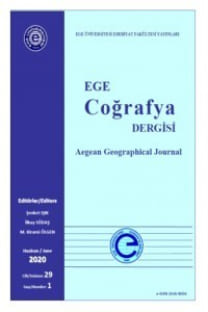TÜRKİYE’DE KENTSEL DÖNÜŞÜM POLİTİKALARI VE UYGULAMALARI ÜZERİNE COĞRAFİ DEĞERLENDİRMELER: İZMİR ÖRNEĞİ
Kentler karmaşık ve dinamik yapıları olan yerleşim birimleridir. Bu dinamik yapıları nedeniyle de kuruldukları günden bu yana sürekli değişim içinde olmuşlardır. Kentlerin bu değişen yapılarına paralel olarak kentsel yerleşimlere ilişkin araştırmaların konuları da zaman içinde değişim göstermiştir. Nitekim geçmiş yıllarda kentsel yerleşimlere ilişkin çalışmalarda kent yapısı ve fonksiyonları kendi içerisinde incelenirken, günümüzde küreselleşmenin kentler üzerindeki etkileri, kentsel mekân ve kentli sorunları gibi konular irdelenmekte, gün geçtikçe artan yeni kentsel sorunlara çözüm arayışlarına gidilmektedir. Kuşkusuz değişen bu süreçlerle birlikte, kentsel sorunların çözümüne yönelik yaklaşımlar da farklılaşmaktadır. Ancak kent içi ve yakın çevresinde yerleşime açılabilecek alanların giderek daralması ve yeni kentsel alanlar yaratma konusunda yaşanan sıkıntılar yerel yönetimleri ve plancıları kent içindeki çöküntü/gecekondu alanlarının planlı müdahalelerle yeniden kente kazandırılması seçeneğine yöneltmiştir. Bu eğilimin diğer adı kentsel dönüşümdür. Bu çalışmada, ülkemizde kentsel sorunların temel kaynağı olarak görülen gecekondulaşma sürecini çarpıcı bir biçimde yaşayan İzmir örneğinde projelendirilen kentsel dönüşüm çalışmaları eleştirel bir yaklaşımla incelenecektir. Bu çerçevede, söz konusu projenin yer seçimi, mekânsal kullanım detayları, projeden beklenen avantajlar ve olası dezavantajlar, uygulama alanında yaşamakta olan mahalle sakinlerinin proje konusundaki görüş ve beklentileri alanda gerçekleştirilen araştırmalar çerçevesinde ortaya konmaya çalışılacaktır.Anahtar Kelimeler: Kent, kentleşme, gecekondu, kentsel dönüşüm, İzmir
Anahtar Kelimeler:
Kent, kentleşme, gecekondu, kentsel dönüşüm, İzmir
Geographical Assessments on Urban Transformation Politics and Projects in Turkey: Case of Izmir
Cities are settlement units with complicated and dynamic structures. Due to their dynamic structures concerned, they have always undergone change since their establishment. The subjects of research on urban settlements changed in time, which is parallel to this changing structure of cities. Likewise, in previous years the urban structure and functions were examined within them in the studies on urban settlements, whereas today issues, such as the impacts of globalization on cities, the urban space, and the problems of city dwellers, are investigated and solutions are sought for new urban problems that are increasing day by day. Doubtlessly, with these changing processes, the approaches to the settlement of urban problems also vary. For instance, in the past, urban problems were solved with solutions like the planning of new urban sites. However, the limited new sites likely to be opened for settlement, the consumption of these sites as they were opened for settlement, and the problems experienced as regards the need for new settlement areas to develop in the city brought to the agenda the requirement of providing the city with the existing depressions again through planned interventions, in other words, urban transformation.The urban transformation activities projected within the framework of the example of İzmir squatting quarter in Izmir that evidently experiences the process of squatting observed in our country as the source of urban problems will be examined with a critical approach in this study. Within this framework, it will be intended to evaluate the choice of location for the project concerned, the details of spatial use, the advantages and possible disadvantages expected from the project, and the views and expectations of the neighborhood residents living in the implementation area about the project within the framework of the research made in the area. Key words: Globalization, urbanization, urban transformation, slum, Turkey, Izmir.
Keywords:
-,
- Yayın Aralığı: Yılda 2 Sayı
- Başlangıç: 1983
- Yayıncı: Prof. Dr. Şevket IŞIK
